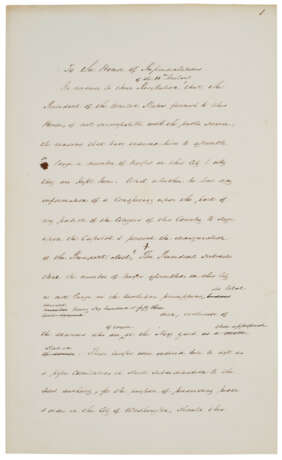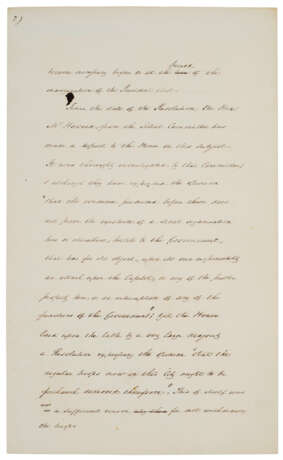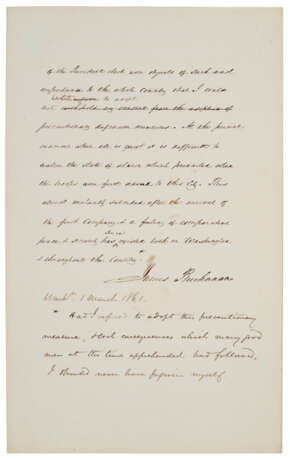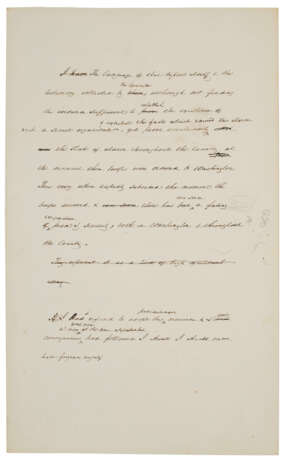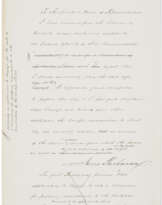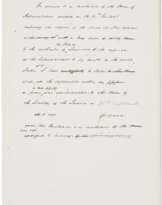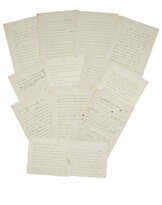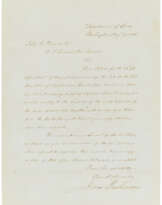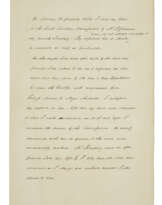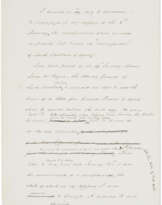ID 1119210
Los 145 | Securing the capital for Lincoln's inauguration
Schätzwert
$ 150 000 – 200 000
James Buchanan, 1 March 1861
BUCHANAN, James. (1791-1868). Autograph manuscript signed ("James Buchanan") as President to "The House of Representatives," Washington, 1 March 1861.
Four pages on two bifolia, 347 x 209mm, numerous corrections and emendations, several in an unidentified hand (light toning at extremities). [With:] a second and presumed earlier autograph draft of the same message, unsigned, two pages, bifolium, 347 x 209mm, with corrections and emendations in Buchanan's hand.
James Buchanan defends his decision to call troops to protect the nation's capital during the counting of electoral votes from the election of 1860 and the inauguration of his successor, Abraham Lincoln: "Had I refused to adopt this precautionary measure, & evil consequences … had followed, I should never have forgiven myself." As the secession movement gained momentum in January 1861 in the wake of Abraham Lincoln's election in November, many began to worry that the nation's capital, sandwiched between two slave states, could be vulnerable to hostile forces bent on preventing the Illinois lawyer from taking office. Despite Buchanan's misgivings that the move would upset Southerners who remained in the city, General Winfield Scott ordered additional troops to protect Washington. Meanwhile, some Republicans, suspicious of the President's real loyalties, read the move as an attempt to stage a pro-Southern coup d'état. [1] Fortunately, Scott's preparations appeared to have prevented any significant violence on 13 February 1861, the day the electoral votes were counted. Guards were posted at every entrance, barring admission to the galleries for anyone not possessing a written ticket of admission. But, according to the recollection of one observer, "the amount of profanity launched forth against the guards," by those who were unable to gain admission, "would have completely annihilated them if words could kill." [2]
When the electoral count was completed without an armed force attempting to seize Washington, Congress formed a select committee to inquire whether there was evidence of any hostile plot against the capital, questioning whether troops had been a necessary precaution. Buchanan issued this public message in response to that inquiry, asking pointedly, "what was the duty of the President at the time the troops were ordered to this city? Ought he to have waited, before this precautionary measure was adopted, until he could obtain proof that a secret conspiracy existed to seize the capital? In the language of the select committee, this was ‘in a time of high excitement consequent upon revolutionary events transpiring all around us, the very air filled with rumors, and individuals indulging in the most extravagant expressions of fears and threat' ... [T]he peace and order of the city itself, and the security of the inauguration of the President elect, were objects of such vast importance to the whole country that I could not hesitate to adopt precautionary defensive measures." Based on the two drafts, his most poignant passage, its final place in the text marked with an asterix, was added at the very last minute: "Had I refused to adopt this precautionary measure, and evil consequences, which may good men at the time apprehended, had followed, I should never have forgiven myself." Three days later, Lincoln's inauguration would also proceed as planned. As they rode together in a carriage from Willard's Hotel to the Capitol, Buchanan famously said to Lincoln: "If you are as happy in entering the White House as I shall feel on returning to [my home] Wheatland, you are a happy man." [3] Published in John Basset More, ed., The Works of James Buchanan. Philadelphia & London: J. B. Lippincott Company, 1910. Vol. 11, pp. 152-154.
_____________
[1] Jean Baker, "The South Has Been Wronged," in John W. Quist and Michael J. Birkner eds., James Buchanan and the Coming of the Civil War. (Gainesville: University of Florida Press, 2013), p. 180.
[2] Lucius E. Chittenden, Recollections of President Lincoln and His Administration. (New York: Harper & Bros., 1891), p. 41.
[3] Philip Klein, President James Buchanan: a Biography. (University Park: Pennsylvania State University Press, [1962]), p. 402.
| Künstler: | James Buchanan (1791 - 1868) |
|---|---|
| Kategorie des Auktionshauses: | Briefe, Dokumente und Manuskripte |
| Künstler: | James Buchanan (1791 - 1868) |
|---|---|
| Kategorie des Auktionshauses: | Briefe, Dokumente und Manuskripte |
| Adresse der Versteigerung |
CHRISTIE'S 20 Rockefeller Plaza 10020 New York Vereinigten Staaten | ||||||||||||||
|---|---|---|---|---|---|---|---|---|---|---|---|---|---|---|---|
| Vorschau |
| ||||||||||||||
| Telefon | +1 212 636 2000 | ||||||||||||||
| Fax | +1 212 636 4930 | ||||||||||||||
| Nutzungsbedingungen | Nutzungsbedingungen | ||||||||||||||
| Versand |
Postdienst Kurierdienst Selbstabholung | ||||||||||||||
| Zahlungsarten |
Banküberweisung | ||||||||||||||
| Geschäftszeiten | Geschäftszeiten
|
